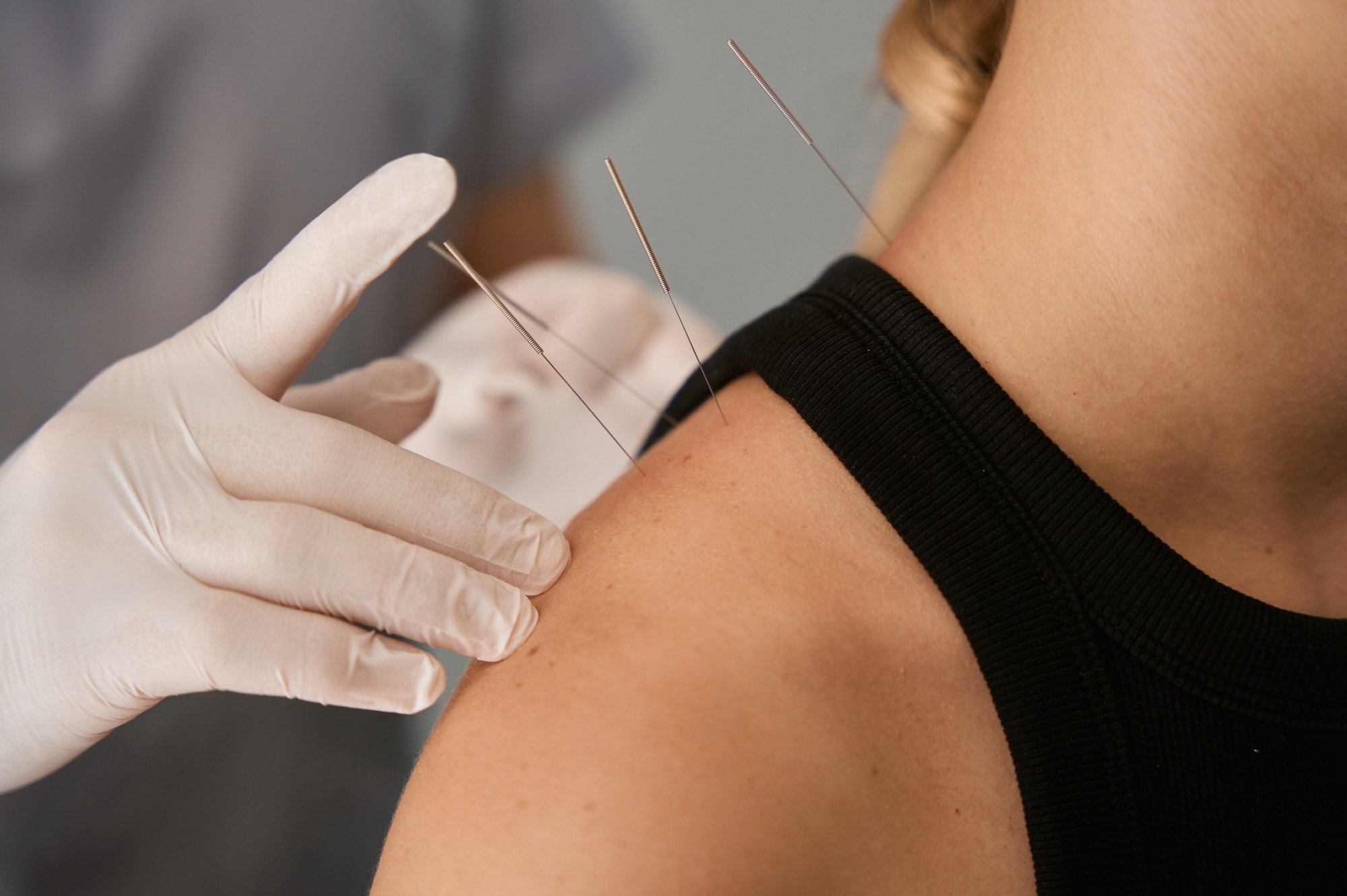Poor sleep is known to accelerate the progression of the disease, making this study significant for patient care.
 Study: Acupuncture and Sleep Quality Among Patients With Parkinson Disease. Image Credit: YAKOBCHUK VIACHESLAV/Shutterstock.com
Study: Acupuncture and Sleep Quality Among Patients With Parkinson Disease. Image Credit: YAKOBCHUK VIACHESLAV/Shutterstock.com
Background
Parkinson's disease is a neurological disease with complex pathophysiology, characterized by muscle rigidity, slow movement or bradykinesia, tremors while resting, and instability in posture.
Non-motor symptoms also begin to appear and dominate as the disease progresses, contributing to an increase in disability and lower quality of life.
One of the predominant non-motor symptoms is a decrease in sleep quality, which occurs not only with the advancement of the disease but also as one of the side effects of the medications used to treat Parkinson's disease.
Studies have also found that poor sleep in Parkinson's disease patients is linked to faster gait deterioration and dyskinesia, as well as the accelerated progression of cognitive and mood-associated symptoms.
About the study
In the present study, the researchers conducted a randomized, double-blind clinical trial to determine whether acupuncture was a safe and effective method to improve sleep quality in Parkinson's patients.
The trial compared the impact of real acupuncture against that of sham acupuncture. It evaluated the improvements in parameters such as anxiety, motor and non-motor symptoms, sleep quality, and health-related quality of life.
Although options to manage sleep disorders in Parkinson's disease patients are limited, the available methods focus on dopaminergic therapy optimization, especially if non-motor symptoms contribute to sleep disorders.
Furthermore, while antipsychotics and antidepressants such as benzodiazepines are effective, these medications often result in side effects such as imbalance and sedation or sleepiness during the day.
Acupuncture is a traditional form of therapy that has been practised in China for years and involves the insertion of thin needles into trigger points or acupoints. It has been used along with Parkinson’s disease medications as adjunctive therapy.
In the present study, patients were included in the trial if they had been diagnosed with idiopathic Parkinson's disease, were between 30 and 80 years of age, had reported moderate to severe problems with sleep quality, had regularly been using their Parkinson's disease medications over the last month, and could tolerate acupuncture.
Before the baseline assessments were conducted, the participants were randomized into the real acupuncture and sham acupuncture groups. Furthermore, an auxiliary acupuncture device was used to circumvent some of the shortcomings of the existing sham acupuncture devices.
This auxiliary device could simulate the blocking sensation experienced during needle entry and allow the direction and angle of the acupuncture to be adjusted.
All participants received guidance about sleep hygiene and received either real acupuncture or sham acupuncture at the same acupuncture points. The acupuncture was administered thrice a week for four weeks.
The primary outcome examined in the study was the change in Parkinson's Disease Sleep Scale (PDSS) score at the end of four weeks and the eighth-week follow-up.
This 15-item score scale evaluated eight aspects of night sleep in Parkinson's disease patients, including overall sleep quality, nocturnal restlessness, insomnia, nocturia, nocturnal psychosis, sleep refreshment, daytime dozing, and nocturnal motor symptoms.
Results
The study found that acupuncture significantly improved sleep quality among Parkinson's disease patients and was beneficial to the quality of life.
The participants in the real acupuncture group showed an increase of 29.65 points in the PDSS score at the end of the four weeks of treatment, and these improvements were sustained till the eighth-week follow-up.
Although the patients in the sham acupuncture group also showed a 10.47-point increase in the PDSS score at the end of the treatment period, the beneficial effects of sham acupuncture on sleep quality were not sustained till the follow-up at eight weeks.
The researchers concluded that while sham acupuncture has a placebo effect in improving sleep quality in the short term among Parkinson's disease patients, these clinical effects are not as long-lasting as seen with real acupuncture.
The PDSS scores for the patients in the real acupuncture group showed improvements along all the items on the scale, including motor and non-motor symptoms and health-related quality of life. No serious adverse effects were reported.
Some of the patients experienced severe tremors, which were believed to be due to anxiety related to the procedure. However, the tremors were found to subside shortly after the needle was inserted.
Conclusions
Overall, the findings suggested that acupuncture had significant benefits in improving nocturnal sleep quality and overall quality of life among patients with Parkinson's disease.
The procedure was safe and effective, with long-lasting improvements in sleep quality.
Journal reference:
-
Yan, M., Fan, J., Liu, X., Li, Y., Wang, Y., Tan, W., Chen, Y., He, J., & Zhuang, L. (2024). Acupuncture and Sleep Quality Among Patients With Parkinson Disease: A Randomized Clinical Trial. JAMA Network Open, 7(6), e2417862–e2417862. doi:10.1001/jamanetworkopen.2024.17862. https://jamanetwork.com/journals/jamanetworkopen/fullarticle/2820371